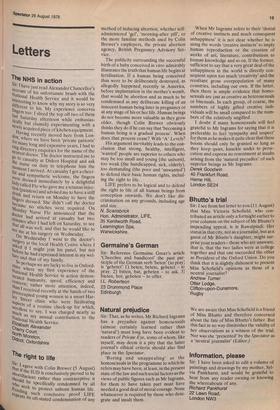Natural prejudice
Sir: That, as he writes, Mr Richard Ingrams has a prejudice against homosexuals (almost certainly learned rather than 'natural') must long have been evident to readers of Private Eye, some of whom, like myself, may deem it a pity that the latter journal's ethical criteria should also find place in the Spectator.
'Boring and unappealing' as the homosexuals in the programme to which he refers may have been, at least, in the present state of the law and such social factors as the views of public figures such as Mr Ingrams, for them to have taken part must have needed a good deal of moral courage. None whatsoever is required by those who denigrate and insult them. When Mr Ingrams refers to their 'denial of creative instincts and much consequent unhappiness' it is not clear whether he is using the words 'creative instincts' to imply human reproduction or the creation of works of art, literature, contributions to human knowledge and so on. If the former, sufficient to say that a very great deal of the unhappiness in the world is directly consequent upon too much 'creativity' and the resultant gross overpopulation of many countries, including our own. If the latter, then there is ample evidence that homosexuals are just as creative as heterosexuals or bisexuals. In each group, of course, the numbers of highly gifted creative individuals will be small compared to the numbers of the relatively ungifted. I doubt if many homosexuals will feel grateful to Mr Ingrams for saying that it is preferable to feel 'sympathy and respect' for them as he makes it quite clear that these boons should only be granted so long as they keep quiet, knuckle under to persecution and express no resentment at insults arising from the 'natural prejudice' of such superior beings as Mr Ingrams.
Derek Goodwin 40 Frankfurt Road, Herne Hill, London SE24






























 Previous page
Previous page